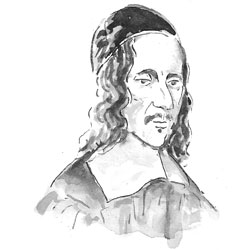George Herbert
Born in Montgomery, Wales in 1593 into a wealthy family, George Herbert was the seventh of ten children. When his father died in 1596, the family moved to Oxford and then to London. Herbert was tutored at home before entering Westminster School in 1604. On 5 May 1609 he was admitted to Trinity College, Cambridge, received the degree of Bachelor of Arts in 1613, and became a minor Fellow in 1614 before being promoted to a major Fellowship and Master of Arts status in 1616. By 1620 he had been given the privilege and responsibilities of the University Orator's position. As his extant letters reveal, Herbert's time in Cambridge was marked by ill health and worries about money. At Trinity he began both to write devotional poetry and to consider a career in the Church. The role of University Orator involved writing and addressing official speeches to King and court, as well as to visiting dignitaries and ambassadors. Herbert spent some time away from Cambridge in 1624 after he was elected MP for Montgomery.
Herbert was ordained deacon in 1625 or 1626. By this time John Donne was a close family friend, and when Herbert's mother died in 1627 Donne preached the sermon at her funeral. Today Herbert is perhaps most often associated with the parish of Bemerton, Wiltshire, where he spent the last three years of his life as rector. Nicholas Ferrar arranged for the devotional poems which became known as The Temple to be published in Cambridge after Herbert's death in 1633 by the university printer, and such was its success that by 1641 there had been six editions. His most significant piece of prose writing, A Priest to the Temple (or The Country Parson) was written during his final years at Bemerton and published in 1652. Other works include letters, Latin verse, and translation projects, such as the rendering of Francis Bacon's Advancement of Learning into Latin.
The Herbert resources on Cambridge Authors approach him from several angles. On the menu on the left you'll find articles that introduce his key works and suggest how they fitted into his life - The Temple in particular, and The Country Parson. You will also find essays that posit similarities and differences with other seventeenth-century poets - especially Donne, Crashaw, and Vaughan. If you find Herbert interesting, then other writers were tackling the same challenges in very different ways. Finally - and not to be missed - you will find resources in which you can hear Herbert as well as read him. He was the University Orator, and we have another, more recent University Orator, reading some of his prose writing. His work has also been set to music many times, and we are very fortunate to have commissioned some special performances for this site: have a listen, and think about what difference the music makes to how you understand the poems.
Choosing a text or texts of Herbert's works will depend on your reasons for reading him, and your reading habits. Helen Wilcox's magisterial recent edition of Herbert's English poems for Cambridge University Press only comes in hardback, and has a price tag to match, but it will make a long-lasting, if massy, reading copy. The paperback Penguin edition of the English poems, edited by John Tobin, can more easily be tucked in a large pocket - perfect if you plan to read Herbert on the go, frequently, or when the occasion demands him.
